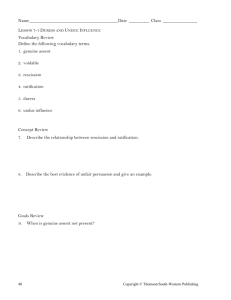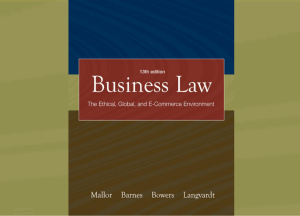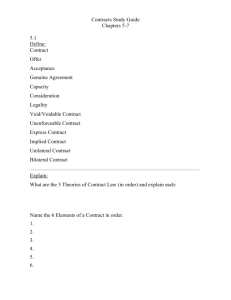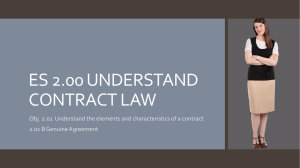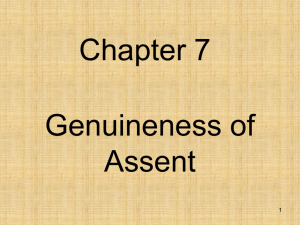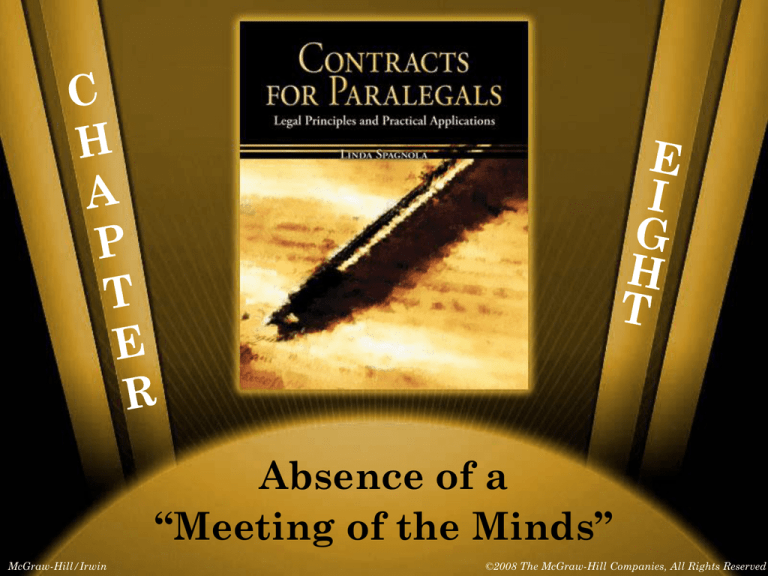
Absence of a
“Meeting of the Minds”
McGraw-Hill/Irwin
©2008 The McGraw-Hill Companies, All Rights Reserved
Objectives
Chapter Objectives:
• Use vocabulary regarding mistake, duress,
undue influence, fraud, misrepresentation, and
unconscionability properly
• Determine if there has been a “meeting of the
minds”
• Discuss difference between unilateral & mutual
mistake
• Evaluate the ramifications of each kind of
formative defect on the enforceability of a
contract
8-2
Objectives
Chapter Objectives:
• Identify the three different kinds of duress
• Determine the intention and reasoning of the
parties entering into a contract
• Identify the differences between a finding of
fraud or negligent misrepresentation
• Evaluate whether a court might find a contract
unconscionable
8-3
Definitions
• Meeting of the Minds
– A theory holding that both parties must
both objectively and subjectively intend to
enter into the agreement on the same terms
– The parties must have the same understanding of the contractual terms and
consideration
– If it is discovered that there are differing
interpretations of the terms or improper
reasons for entering into the bargain (flawed
consideration), then the courts may allow
the “innocent” party to avoid the contract
8-4
Meeting of the Minds
• There are five types of failures to agree on the
terms or reasons for entering into the
agreement:
1. mistake
2. duress
3. undue influence
4. fraud and misrepresentation
5. unconscionability
8-5
Mistake
• Unilateral Mistake
– An error made by only one party to the
transaction
– The contract may be avoided only if the
error is detectable or obvious to the
other party
8-6
Mistake
• Unilateral Mistake
– Poor judgment: Contract law does not
allow avoidance of performance obligations
due to a mistake that was simply a bad
decision on the part of one party
– Poor judgment can only be known to the
mistaken party and is not a basis for
avoidance of the contract
– The drafting party usually is held
responsible for the content of the contract
so, if there is a mistake, it is held against
them
8-7
Mistake
• Mutual Mistake
– An error made by both parties to the
transaction; therefore, neither party had
the same idea of the terms of the agreement
– The contract is avoidable by either party
8-8
Mistake
• Mutual Mistake
These mistakes generally relate to
1. the existence of the subject matter
2. the ownership or the right to transfer
ownership, or
3. the identity or quality of the subject
matter
8-9
Mistake
• Mutual Mistake
If either party wants to avoid the contract,
they may, provided that:
1. the mistake relates to a material aspect of
the contract
2. it has a detrimental effect on one or both
parties
3. it could not have been foreseen
8-10
Duress
• Duress
– Unreasonable and unscrupulous
manipulation of a person to force him to
agree to terms of an agreement that he
would otherwise not agree to
8-11
Duress
• Physical Duress
– The threat of bodily harm unless the
aggressor’s demands are met
• Economic Duress
– The threat of harm to a party’s financial
resources unless demands are met
8-12
Duress
• Mental Duress
– The threat of harm to a party’s overall
well-being or a threat of harm to loved
ones that induces stress and action on the
party of the threatened party
8-13
Duress
• Contract of Adhesion
– An agreement wherein one party has total
control of the bargaining process therefore
the other has no power to negotiate and no
choice but to enter into the contract
• Blackmail
– The extortion of payment based on a threat
of exposing the victim’s secrets
• Abuse of Process
– Using the threat of resorting to the legal
system to extract agreement to terms
against the other party’s will
8-14
Undue Influence
• Undue Influence
– Using a close personal or fiduciary
relationship to one’s advantage to gain
assent to terms that the party otherwise
would not have agreed to
• Fiduciary Relationship
– A relationship based on close personal
trust that the other party is looking out for
one’s best interests
8-15
Undue Influence
These seemingly kind actions belie the
wrongful intent to deceive and control
someone who is not in a position to think
reasonably or independently for herself in
this powerful situation.
8-16
Fraud & Misrepresentation
• Fraud
– A knowing and intentional misstatement of the
truth in order to induce a desired action from
another person
• Misrepresentation
– A reckless disregard for the truth in making a
statement to another in order to induce a desired
action
• Intent to deceive
– The party making the questionable statement
must plan on the innocent party’s reliance on the
first party’s untruthfulness
8-17
Fraud & Misrepresentation
• Fraud and misrepresentation are cousins
• Contractual fraud-in-the-inducement has five
elements:
1. the statement made to the other party
2. regarding a material fact
3. with the intent to deceive, and
4. the lie was relied upon by the innocent
party
5. the reliance somehow harmed the
innocent party
8-18
Fraud & Misrepresentation
•
The intent to deceive is the defining
element of fraud. A person must know and
intend to make a material falsehood in order
to perpetrate fraud upon another party
•
A party is culpable of negligent misrepresentation where that party could or should
have known of the truth but did not ascertain
that truth before relating the falsity to the
innocent party. Negligent misrepresentation
is more akin to a sin of omission rather than
one of commission
8-19
Fraud & Misrepresentation
•
Nondisclosure
– The intentional omission the truth
•
Nondisclosure is a tricky area in fraud and
misrepresentation
– When a party has an obligation to
disclose all information known to
him/her, the intentional withholding of
that information can rise to either fraud
or negligent misrepresentation
8-20
Fraud & Misrepresentation
• Affirmative Duty
– The law requires that certain parties
positively act in a circumstance and not
have to wait until they are asked to do
that which they are required to do
– The law imposes an affirmative duty to
disclose the truth about the condition of
the property or item
– It is only where the law imposes an
affirmative duty to disclose that
nondisclosure is actionable
8-21
Fraud & Misrepresentation
• Active Concealment
– Knowingly hiding a situation that
another party has the right to know and,
being hidden from them, assumes that it
does not exist
8-22
Unconscionability
• Unconscionability
– So completely unreasonable and irrational
that it shocks the conscience
–
May be found where none of the other
defects in formation apply, but the court
cannot permit the oppressing party to
escape some liability for taking
unscrupulous advantage of another
8-23
Unconscionability
• Unconscionability
– The court can choose a variety of remedies
to either release the innocent party from
her contractual obligations or to level the
playing field and enforce the contract but
without the offensive term so that a fair
result is accomplished
8-24
Summary
•
•
An “agreement” in contract law means
that there has been a meeting of the
minds with respect to all material terms
of the contract
There are five general types of such
failures to agree on the terms or reasons
for entering into the agreement:
1.
2.
3.
4.
5.
mistake
duress
undue influence
fraud and misrepresentation
unconscionability
8-25
Summary
• Where one party has forced or coerced
the other into making the contract,
contract law will allow avoidance on the
basis of duress. Duress can be physical,
economical, or mental
• An unconscionable term is one that no
reasonable person would freely agree to
as it is so unfair and one-sided. It shocks
the conscience of the court that anyone
would actually make that type of offer or
a person could accept it
8-26

